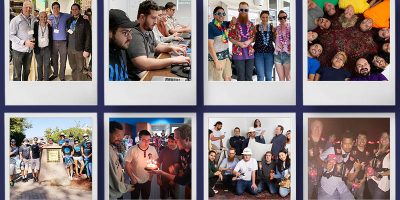How can a business develop a winning culture? Feedonomics’ CEO, Shawn Lipman, shared his insights on the “And Then I…” podcast from Aria Coach, hosted by leadership consultant Christine Grimm. “And Then I…” features interviews with business leaders who share their learnings on the path toward success and can inspire others to make meaningful improvements for their own organizations.
On the episode, “Building a Sustainable Winning Culture and Business,” Shawn explained how his past and present experiences, including accomplishments and failures, influenced his values and helped him develop the workplace strategies and culture that keep Feedonomics on a positive trajectory. We’ve shared three tips below that have helped us develop a winning team culture at Feedonomics.
1. Unify the team with a set of shared values.
Growing up in South Africa with two significantly older brothers, a sense of competition shadowed Shawn through his childhood. Therefore, Shawn began to use rugby as an outlet for this competition, which quickly turned into a lifelong passion, and culminated in his induction to the US Rugby Hall of Fame in 2019. Many of the lessons that he learned playing rugby served as valuable guidelines to run an effective and successful company. He saw how, on a rugby team, it is absolutely essential for all players of the team to work together, communicate, and trust each other.
To create an environment for collaboration, Shawn modeled Feedonomics’ culture around the teambuilding ideas found in a book about the All Blacks rugby team, “Legacy,” by James Kerr. Kerr analyzes what enables the All Blacks to be one of the most successful teams in all of sports history. Shawn incorporated the lessons from “Legacy” to develop a set of “Feed On” principles, 15 core values that unite the people at Feedonomics.
The “Feed On” principles emphasize leadership, mindfulness, equality, collaboration, trust, and other values necessary to succeeding as a unit. In Shawn’s view, a “winning culture” is one where all members of the team genuinely work to their full potential to deliver nothing but the best service possible.
2. Don’t focus on results, focus on the foundation.
Shawn refers to a “pyramid of success,” which he instills in his everyday practices. At the base of the pyramid is trust; trust within the organization is the foundation of long-term success. Rather than focus on the results and the outcomes at the top of the pyramid, leaders should focus on the foundation.
Christine remarks on how many business leaders make the mistake of “taking on a set of outcomes, and building a strategy around those outcomes,” which ultimately fails because the foundation is weak. It’s more important to focus on teamwork, progress, and improvement rather than measuring success against expected outcomes. By instilling the foundational value of trust in the workplace, all team members are working in an environment where it feels safe and productive to give and receive feedback. It is all part of creating a learning environment where teachers are leaders, and leaders are teachers.
Leaders can establish trust by communicating openly and honestly. Shawn shares the big picture with the entire team at Feedonomics during company meetings, because there is no end result without the collective efforts of all the team members making progress. Leadership is not just about sharing good news. Shawn says it is essential to communicate bad news as well, because it’s like “a dam about to burst,” even if it’s news that no team member wants to hear. Without transparency, it’s much harder to have alignment across the organization.
3. Remove ego from the workplace.
Productive open communication requires a dedication to managing one’s emotions. Many times, it’s not easy to remain calm under pressure. Shawn speaks about how his ability to control his emotions and have a constant mindset are keys to moving forward.
It’s also important to identify people who are more focused on their own achievements at the expense of the rest of the team, and address these issues. Shawn believes that pandering to narcissistic behavior can be one of the primary reasons for a team’s failure. By removing ego and negativity from the workplace, there is a greater chance for growth and productivity.
This doesn’t mean that everybody should agree with each other all the time. In fact, Shawn believes that conflict is an important part of the decision-making process, because there needs to be constructive debate before there is growth in a team. The “Feed On” principles help ensure that team members engage with each other in good faith and focus on finding solutions together. Being able to have healthy conflict is the primary building block to ensuring commitment and resultant accountability. Only then can we expect results.
Shawn’s advice to any future CEO is that the key to success is freeing oneself from innate reactive emotions and becoming a lifelong learner. By listening to feedback from one’s team, it becomes easier to make decisions with clarity and purpose.
Watch the rest of the podcast to see more business leadership tips from Shawn, and check out Aria Coach for more team-building guidance and direct leadership coaching.

With its leading data feed management platform, Feedonomics helps brands, retailers, and agencies optimize and list products on hundreds of shopping destinations around the world. Learn more about our full-service solutions for advertising channels and marketplaces.
